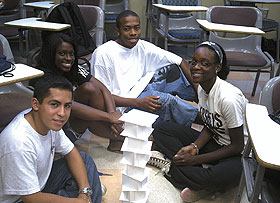  |
| HOME | THIS ISSUE | CALENDAR | GRANTS | BACK ISSUES | < BACK | NEXT > |
Science program for minority students fosters leadership skills by Sherry Fisher - October 6, 2008 | ||||
| Underrepresented students studying science, technology, engineering, and mathematics are better able to achieve success thanks to the Louis Stokes Alliance for Minority Participation (LSAMP) Leadership and Academic Enhancement Program. The program, funded through the National Science Foundation, is part of an alliance of New England institutions designed to strengthen the preparation and success of historically underrepresented students in the sciences. The LSAMP program was launched at UConn by Damon Williams, former assistant vice provost of multicultural and international Affairs. It is now directed by Ruth Washington, professor of molecular and cell biology. Freshmen who fit the target population are invited to join the program. There are currently 56 LSAMP scholars at UConn; 24 have graduated since the program’s inception in 2003. “From the time they are freshmen, we want to help these students thrive and achieve at high levels,” says Joy Erickson, coordinator of the program. “We want to help them learn how to handle the rigors of their studies, how to network and build relationships with peers and faculty, and enhance and develop their leadership skills.” The scholars have special advisors who help with any academic and social problems, and they are encouraged to engage in research internships after their first year. Erickson says the program is working. “LSAMP scholars in their first year have an average GPA of 3.0,” she says. “Our comparison group – students who were invited to join LSAMP but declined – had an average GPA of 1.6 after their first year.” Ronald Taylor, vice provost for multicultural and international affairs, says the program “has been a singular success and a genuine model for similar programs across the country. I think we can all be extremely proud of what we have accomplished here.” Leadership is a theme that runs through the program, Erickson says, noting that the fall semester is kicked off with a Leadership Launch at Holiday Hill in Mansfield. There, students take part in team building and trust exercises. Students, particularly in the sciences and engineering, do better when they study in teams, says Erickson, noting that underrepresented students often study alone. “We’re trying to change the culture and get them to study in groups,” she says. She also encourages them to work with tutors. “We try to get them to use tutors, because they often think that you only go to tutoring if you’re ‘dumb.’ Special program assistants, who are upperclassmen, also work with the new students. It’s all about networking and building trust.” Erickson says the program gives students a strong sense of belonging, a necessary ingredient for success. “When researchers looked at reasons why one person is successful and another person is not, and why one person left a university and another stayed, one of the things that was quite apparent was their sense of belonging and being part of something,” she says. And that, she says, can be more important than money.
“Other programs may give students money, a ceremony, and a handshake,” Erickson says. “In our program, they’ll be involved in relationships. That’s what they need: conversations, relationships, and one-on-ones.” Atinuke Oyeniya, a junior majoring in civil engineering, says she gained “valuable skills” as a LSAMP scholar. “The leadership and team building experiences where we learned to do group projects were very helpful,” Oyeniya says. “Joy was very helpful. I got good advice, and got to know people who are in the math and science areas.” Andrea Tovar, a senior majoring in psychology and Spanish, started as a pre-med major but ended up on academic probation in her sophomore year. “I was in transition,” Tovar says, “and needed help.” She says tutors and mentors helped her turn things around. “LSAMP definitely opened opportunities for me,” says Tovar, who is focusing on neuroscience in the psychology department, and plans to attend graduate school. “It was great to work and study with students who have similar interests.” LSAMP scholars are strongly encouraged to do research or an internship during the summer. “We tell them that college is their job for the next four to five years, and summer should be spent working toward their goals,” Erickson says. Upperclassman who are LSAMP scholars are encouraged to talk to freshmen about their summer experiences, as well as their leadership roles at the University. LSAMP students take a First Year Experience class with Erickson, which focuses on the program. One of her main goals is to ensure the students get to know each other. They also learn about time management and study strategies, and discuss discrimination and stereotypes. “Many underrepresented and first-generation students don’t realize how exceptional they are,” Erickson says. “I try to reinforce how smart they really are.” Erickson says one of the problems for underrepresented and first-generation students is the lack of role models. LSAMP students serve as role models for children, particularly in inner city schools. In a program called The Science Wizards, LSAMP scholars visited 10 middle schools in three weeks. “It’s so important for LSAMP students to give back to their communities,” says Erickson. “It’s an integral part of the pipeline.” |
| ADVANCE HOME UCONN HOME |

